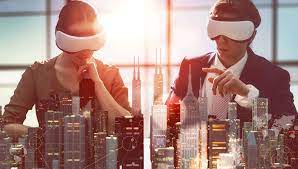
How Virtual and Augmented Reality Revolutionizing Real Estate Industry
Published : 29 Feb 2024Looking ahead, the future of real estate investing holds exciting possibilities. Let’s not forget the role of virtual and augmented reality in real estate. These immersive technologies revolutionizing the real estate industry by enabling investors to virtually tour properties, visualize renovations and experience spaces before making a purchase. Virtual and augmented reality save time enhance decision making and provide realistic experience that was once unimaginable.
Understanding VR and AR
Virtual Reality (VR) is a technology that creates a simulated, computer-generated environment where users can immerse, interact and navigate through the digital space creating a highly engaging experience.
Augmented Reality (AR), on the other hand, enhances the real world environment by overlaying digital content, such as images, videos, or 3D models, onto the user's view of the physical world. Unlike VR, AR does not replace the real world but augments it with additional information or interactive elements.
Following are the ways in which AR and VR is transforming the real estate industry:
-
- Virtual property tours
Virtual property tours enables potential buyers to participate in immersive virtual property tours. It provides incredibly realistic experience, encouraging prospective buyers to navigate through property sites and layouts. VR has revolutionized the way property is viewed and experienced.
-
- Augmented visualization and personalization
Augmented reality has empowered real estate developers and agents to enrich property showcases through augmented visualization and personalization in innovative ways like allowing buyers to customize interior designs, room layout and even furniture arrangements, which increases propensity to make a purchase decision.
-
- Remote Collaboration and Interaction
Geographically dispersed stakeholders, including buyers, agents, and developers, can now engage in virtual meetings and property walkthroughs in real time. This capability has broadened the market for real estate potential buyers and investors. As a result, properties can be marketed to a wider audience, increasing the likelihood of sale.
-
- Accelerating sales process
VR and AR are revolutionizing the real estate sales cycle by accelerating the decision-making process which helps buyers to make more informed decisions by shortening overall sales cycle. The benefits are two-fold, as developers experience reduced holding costs, while buyers enjoy faster property acquisition.
-
- Empowering real estate agents
Virtual and augmented reality technologies empower real estate agents by providing them with access to enhanced data insights and analytics. By analyzing user behavior within VR/AR environments, agents can gain valuable information on buyer preferences, interactions, and engagement patterns.
Conclusion
Virtual and augmented reality have open the doors in new era for the real estate industry offering immersive experiences and transforming traditional processes. From virtual property tours to personalized visualizations, these technologies have streamlined the way properties are bought and sold. They have empowered buyers with greater control and understanding of their potential investment, while also benefiting real estate developers and agents with increased efficiency and market reach. As technology continues to evolve, we can expect virtual and augmented reality to play an even more significant role in building the future of the real estate market bringing buyers and sellers closer than ever before.